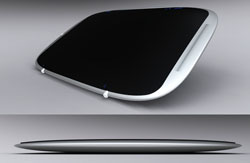
From a technology perspective, this decade — with Apple and Google being exceptions — sucked. There were some interesting things that happened that set us up for the teen decade, though, and that fuel anticipation for the 20s, which a hundred years ago, was actually a decade of wonder and excitement (and had a better name).
Rather than focusing on the negatives, this week I’ll look back on the Aught Decade and some of its memorable products and initiatives.
I’ll close with my product of the week, the first smart-tablet that may define a product class that could dominate the next decade.
Steve Jobs Gets CEO of the Decade
For a guy with a marketing pedigree, having the best marketing-oriented CEO in tech — or in any industry I’m even remotely connected to — get CEO of the decade was a wonderful event. I do wonder what that says about us as a race, because it focuses so much on appearance and not on things that have to do with survival — but given how poorly most companies do in this area, it was a wonderful change.
We almost lost the guy this decade, and without him as an example, many of the marketing efforts many of us are trying to keep alive would have likely failed. In a world increasingly funded by advertising, having someone who does it well rise to the top is an important, powerful — and, for folks like me — critical event.
Google Figures Out Free
The ’90s ended badly with the .coms showcasing that building a company without a good business plan is a bad idea. This decade ended badly because the financial institutions discovered that lending money to people who couldn’t afford to make the payments using collateral that was massively overvalued was a bad idea.
Google helped showcase how to fix problem No. 1 and created an ecosystem that could support, well, a company that delivered free services. The hope is the Obama administration can survive long enough to fix the second problem.
We enter the next decade, largely because of Google, with the promise of more things delivered over the Web to an increasing number of devices that will keep us entertained, productive, and in communication that wouldn’t have resulted if it weren’t for Google figuring out the economics of “free.”
Microsoft Figures Out Security
While the decade was defined by Windows challengers like Linux and the MacOS, the world largely remained on Microsoft this decade and was pounded by identity theft and viruses.
On top of 10 other things, Microsoft stepped up to the security problem first by redesigning Windows XP to make it more robust, then moving aggressively against those that created viruses, and finally by bringing to market Microsoft Security Essentials, a good free antivirus product that is already helping assure we will be vastly safer next decade. It is tough to admit you were wrong, and even tougher to reverse a series of decisions that have surrounded your products for a long time. Microsoft did that, and most of us exit this decade potentially much safer than we entered it as a result.
The Birth of 4G Wide Area Wireless
We ended the ’90s just starting to get our arms around WiFi, and we end this decade with a dramatic increase in the number of airplanes flying with working wireless.
3G is widespread, with Verizon and AT&T fighting over who is best — according to Consumer Reports, it is Verizon by a mile — but it isn’t very affordable. However, recently, 4G started to roll out, which promises even faster data speeds and vastly more affordable monthly charges. A decade from now, thanks to this, people may think of connectivity the way this century thought of electricity: It will virtually always be there.
Birth of the Real E-Book
We actually had e-books come out last decade, but they bellyflopped, and it wasn’t until Amazon launched the Kindle this decade that we got a product that many of us — and I’m one of them — can’t live without. My Kindle goes with me everyplace I go; often this even includes the bathroom.
This has a lot of us back into reading books more and watching TV less and that, I think, is a good thing — especially given how much reality-TV crap is on at the moment.
While we are early into this wave, and there clearly will be new and powerful market-defining products out next, the launch of the e-book connected to a wireless back-end service is as market-changing as the iPod was.
Birth of the iPod
The iPod came to market in this decade, and it redefined what we wanted in a device. It eventually not only pioneered music in our pocket but Web services that could supply it initially with music and eventually with multimedia.
It evolved into the iPod touch and iPhone, and both set the stage for products like the Kindle and made them possible. The iPod is probably one of the most defining products of this decade, one that touched millions of us, was a near perfect blend of hardware design, Web services, and marketing. When it comes to doing things right on all fronts, the teens will have a hard time coming up with something that was done as well as the iPod was.
Wii Breaks Ground for Project Natal
The Nintendo Wii got us up off our collective butts and moving around the living room aerobically and likely lengthened the lives of many of us as a result.
Nintendo executed with a product that differed from the others in that it hit the critical sub-US$200 price point, was fun to play for the whole family, and was profitable (didn’t rely on games subsidies). It sold out for two years.
Microsoft showcased a technology that could transform the next decade of gaming in Project Natal, which turns your body into a controller. The Wii made it possible for what could be the defining gaming technology next decade while schooling both Microsoft and Sony this decade.
Wrapping Up
It has been an “interesting” decade, but I’m kind of glad to see it pass, because it started and ended in pain. The teens are looking to start better, and my hope is they end better as well, as we usher in a new age of computing on the Web with smart-tablets and ever more appliance-like computers.
We started this decade with Steve Jobs on the ropes, Eric Schmidt a failure, and Microsoft largely viewed as scary powerful. A lot changed in 10 years, a lot will change in the next 10 as well.
Product of the Week: The Notion Ink Smart-Tablet

Last week, I talked about the battle between smartbooks and smart-tablets and how I thought that the defining technology might be one from Pixel Qi, which seemed to combine many of the advantages of e-paper with the LCD technology that smartphones, smartbooks, smart-tablets, and notebook computers use.
Tearing up the ether last week was the story that Notion Ink was bringing to market a smart-tablet that uses this technology on top of Nvidia’s stunning Tegra T20 chipset. (It calls it a “smartpad,” but I’ve been asked not to use “pad,” because it reminds too many of a feminine hygiene product.)
Before Apple can launch its own product, there might actually be a better one in this offering, and I can’t remember seeing this before.
The iPhone was proceeded by the LG Prada, but by most measures, the iPhone was better. The tech rumored to be going into the Apple tablet isn’t as advanced as Notion is showcasing, which could create a unique problem for Apple. This new smart-tablet is backed by Google, which has been pounding Apple with the Motorola/Verizon Droid phone of late.
Since smart-tablets may be the next decade’s iPod, because the Notion appears to use Google to blindside Apple — much like Apple blindsided others this decade — and because it is just fricken cool, the Notion Ink smart-tablet (real name coming later) is my product of the week.
Rob Enderle is a TechNewsWorld columnist and the principal analyst for the Enderle Group, a consultancy that focuses on personal technology products and trends.












































